1 June 2012 (Moe's Original Bar B Que, Englewood CO)This show was a great example of the relationship between bands and their fan base. Three of the bands were local and each brought in their own crowds. Opening act White Flag Raised pulled the biggest crowd, packing the floor with enthusiastic friends. They were clearly in the honeymoon phase of their band's development. Blind Brilliance and Convalescents' audience seemed more established.
By contrast, touring band Arison Cain didn't draw a lot of people. They didn't tone down their playing, but it showed how tough it is to tour far from home.
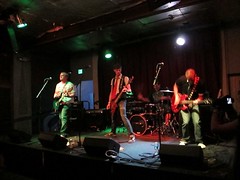
White Flag Raised billed themselves as alternative rock, but this show emphasized their punk and garage sounds. They brought a number of originals, including the religiously themed
Prodigal Son, but their covers elicited the biggest audience response. Their punk cover of
Under the Sea, from Disney's
The Little Mermaid, was a high energy romp for everyone's amusement. They got the strongest crowd reaction with their version of Weezer's
Beverly Hills.
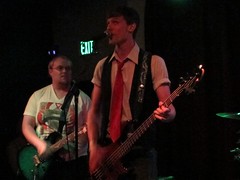
As a fairly young band, White Flag Raised is still developing their stage presence. Lanky Ben Weir acts as the focused front man as he plays his bass, letting guitarist Josh Smith provide the stage dynamics. I've gotten more of a sense of the band from their web presence than their show. Fortunately, their fans could feed back enough love to help the band keep their momentum.
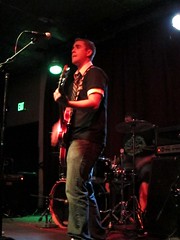
It was a fun set, albeit a little rough. Punk is a fairly forgiving style, but they still needed to tighten their arrangements.

Blind Brilliance cuts straight to the core with the most classic of configurations, the power trio. They nail the clean polished sound of pop punk, but all the cathartic release of traditional punk rock.
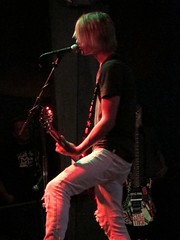
Every band has their own presence, but this was a strong contrast to the opening act. Frontman Steven Zimmerman confidently punched his guitar parts, but also showed off his sense of humor and personality. In between vocal parts, he'd drop back to commune with the drummer or stare down the bass player.
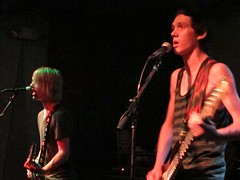
As the band maintained their steady pace through their setlist, Max Points was a study in Brownian motion as he drifted around the stage with his bass. The visual dynamics combined with the full sound to produce a sonic wall worthy of a larger band. Patrick Milburn's drumming laid the framework for that wall. Head down, he pounded his kit with a heavy hand, but still fit in some great fills.
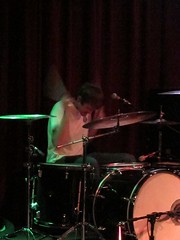
Blind Brilliance has a CD releasing later this month and their original music was all fairly strong. Still, their punk cover of
I Just Can't Wait to be King from Disney's
The Lion King proved to be a crowd pleaser. That would have been enough to win the audience, but the band's instinctive sense of showmanship came through when Zimmerman crossed the stage to push Points away from his mic so he could sing his line there.
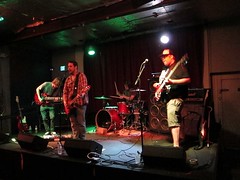
Arison Cain caught a tough break when the audience evaporated before their set. Dead gigs like this are painful, but they're the true test of a band. It takes a lot to overcome the inertia and bring on the rock. Despite the empty room, Arison Cain played a powerful set. Their motto should have been "no crowd, but no surrender".

The band kept their own energy up with a loud stage volume that complemented their strong, hard rock sound. Even when they mixed in some country tinged rock and thoughtful guitar dynamics, the interludes passed back into driving rock. Many of the songs showed off Arison Cain's witty lyrics.
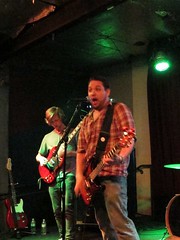
Frontman Arison Cain's website calls his band The Halfway Home Orchestra, but onstage he referred to the band using his own name. Either way, Cain's quirky personality came through. During the songs, he was brash and outgoing. He spent half his time rising up on tip toes just to maintain his forward momentum. Between songs, his patter was droll and self deprecating.
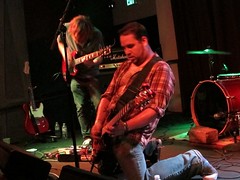
He was a quick thinker, too. Calling back to the earlier sets, he said, "
Nobody told me this was a fucking Disney cover show. I had to figure it out on my own". Then he dove into an a capella version of
A Whole New World from Disney's
Aladdin, with some backing harmony from the bass player, Toby Noll.
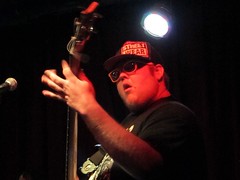
Noll's bass drove much of the mix and he proved to be good foil for Cain's persona. Noll had some smart ass attitude, but his ready grin kept the mood light. Their stage presence balanced out drummer Tyler Townsend and second guitarist Shawn Van Brocklin who were more inwardly focused. Van Brocklin contributed more guitar texture and haze than straight lead.
I don't know whether it's characteristic, but the band tended to drag out the song endings, so people didn't have a clear signal to respond to the band before the next song started. It might have been a defensive move since there were so few us. They may not have wanted any pity, but they earned our respect.

Convalescents avoided Arison Cain's fate as their fans filtered in during the sound check. The solid turnout energized the band to hit the anthemic sound of their recordings. Recently, I've
reviewed Convalescents' new album,
Armageddon as well as their earlier incarnation as DB and the Catastrophe (
review). The band matched the pace of the new album as they filled their set with material from both eras and challenged us all to keep up.
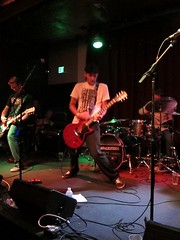
As on the record, frontman Dylan Busby's vocals often reached for a Billie Joe Armstrong feel, matched by the Green Day drive of the guitars. Leaning out at the audience, his vocals and guitar thrash anchored the band's sound. Lead guitarist Gideon Priegel laid down solid riffs; each one seemed carefully worked out to keep the songs zipping by. The guitars and vocals were muddy in the mix at Moe's, but Convalescents' playing proved to be every bit as tight as their recording.

As fine as Busby and Priegel were, the band's rhythm section was the real secret weapon.

Bassist Eric Lehman defined in-the-pocket playing. His melodic bass fills often added power to the chord changes. When he got to show off a little bit, like his John Entwistle style runs at the start of
Broken, it was a treat.
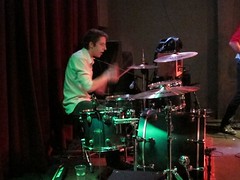
But I was most impressed with drummer Ben Duncan. It's easy to overlook drummers in the back of the stage. As a guitarist, I often take drumming a little bit for granted. But no one could ignore Duncan. Technically, he was one of the fastest drummers I've heard. His kick work sounded like a double bass pedal and he could throw in double time fills or even rolls where a fast drummer would use a single strike. His technique stayed fully in service to the songs, though. The speedy fills and rolls stayed within the core rhythm, giving the drums a busy drive without falling into "drum solo mode" and obscuring the basic beat. Normally, I think "less is more", but now I know that more can be so much more.
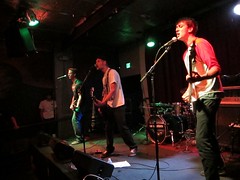
The Convalescents' set was focused on the quality of their playing and their work showed. Without slipping into shoegazer introspection, their most joyous moments came when they knew they were nailing the song.
More photos on my
Flickr.
 Anywhere started as a collaboration between Christian Eric Beaulieu (Tryclops!, Liquid Indian) on guitar and Cedric Bixler-Zavela (At the DriveIn, the Mars Volta) on drums and vocals. Through fortuitous circumstance, legendary Mike Watt (Minutemen, fIREHOSE) joined in on bass. They rounded out the sound with vocals from Rachel Fannen (ex-Sleepy Sun) and extra guitar work from Toshi Kasai (Big Business).
Anywhere started as a collaboration between Christian Eric Beaulieu (Tryclops!, Liquid Indian) on guitar and Cedric Bixler-Zavela (At the DriveIn, the Mars Volta) on drums and vocals. Through fortuitous circumstance, legendary Mike Watt (Minutemen, fIREHOSE) joined in on bass. They rounded out the sound with vocals from Rachel Fannen (ex-Sleepy Sun) and extra guitar work from Toshi Kasai (Big Business).



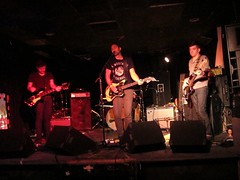
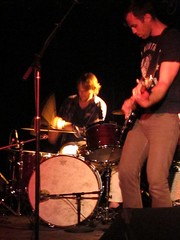


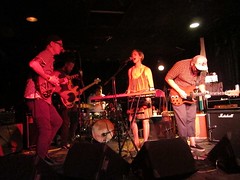


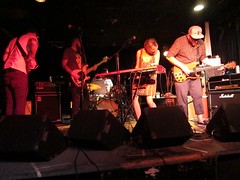


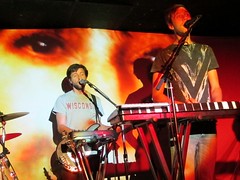



 Barcelona rockers
Barcelona rockers 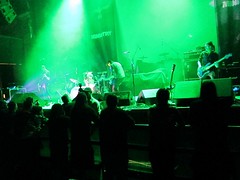

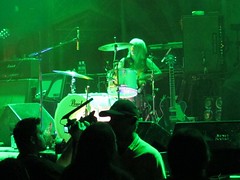
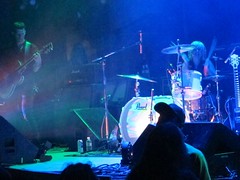

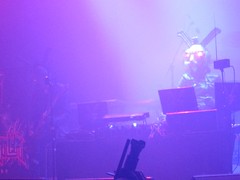
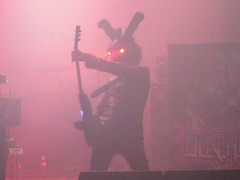
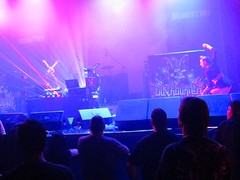

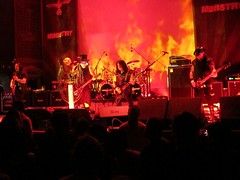
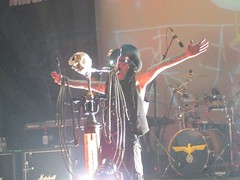
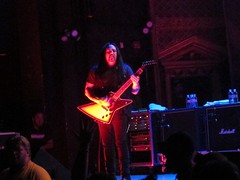

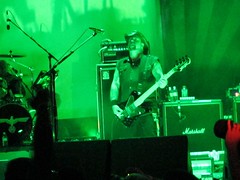
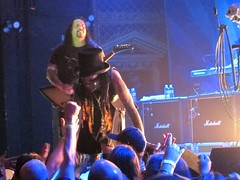
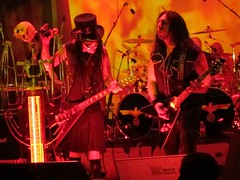

 While the sprawl of
While the sprawl of 
 Sophomore albums are the bane of the recording industry. Band or performers spend years developing their sound and then use up their best material on their debut album. Then they're rushed into the studio to follow up. If their second effort doesn't click, the industry spits them out. There are plenty of performers who overcome, often with the help of the industry, but they're the lucky ones. The indie scene is a little kinder because there's less money at stake, but sophomore albums are often a muddle that doesn't deliver on the freshman hype.
Sophomore albums are the bane of the recording industry. Band or performers spend years developing their sound and then use up their best material on their debut album. Then they're rushed into the studio to follow up. If their second effort doesn't click, the industry spits them out. There are plenty of performers who overcome, often with the help of the industry, but they're the lucky ones. The indie scene is a little kinder because there's less money at stake, but sophomore albums are often a muddle that doesn't deliver on the freshman hype.

















